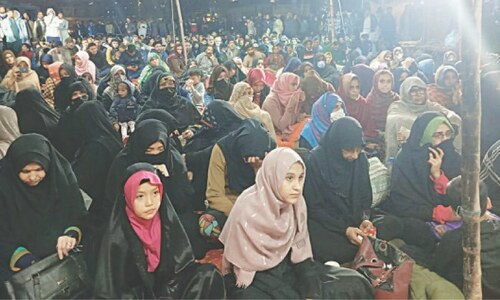KARACHI, Nov 20: Speakers at a seminar on Wednesday regretted the denial of basic rights of quality survival, due care and education to a large majority of the local children, and called for a pragmatic approach at all levels to address the situation.
The seminar was held at the National Institute of Child Health (NICH) to observe the World Children’s Day. The speakers included Health Secretary Amir Ali Burq, Prof Zeenat Issani, Mehtab Akber Rashdi, Zia Ahmed Awan, Fatima Surraiya and Jimmy Engineer.
They sought concerted efforts to alleviate the plight of children in juvenile jails. It was registered with great concern that Pakistan, despite being one of the two countries that actually proposed the Convention of Child Rights adopted by United Nations in 1990 and ratified by Pakistan along with 159 countries, was yet to implement it in letter and spirit.
The health secretary said that lack of proper opportunities for education for a large majority of local children was the biggest injustice against them. He said that in Japan, immediately after the second World War, major allocation was made in the education sector and within a span of 30 years Japan emerged as a country with the most stable social sector.
Mehtab Rashidi said that 3.6 million children under the age of twelve were made to work under in hazardous conditions. She said 240,000 children in the country left their homes at a tender age owing to abject poverty and neglect, 72 per cent of them were died of hunger.
She also mentioned plight of some 400 children jailed at the Karachi Juvenile Jail, kept in a single barrack devoid of proper bedding and necessary accessories. She said they had no visitors, nor were they provided proper recreational facilities. They were experiencing psychological agony, having been abandoned by the society.
She said that 40 the kids were imprisoned at the Juvenile Jail Sukkur. Majority of them were found loitering at night. Their parents were asked for bribes to get their children released. Their inability to do so landed their children in the jails where many of them had spent more than three years without a single hearing.
Zia Ahmed Awan pointed out that a large number of child prisoners were housed in the jails meant for adult prisoners, exposing them to incidents of sodomy. Fatima Suraaiya Bajiya and Jimmy Engineer also spoke on the occasion.—APP














































Dear visitor, the comments section is undergoing an overhaul and will return soon.